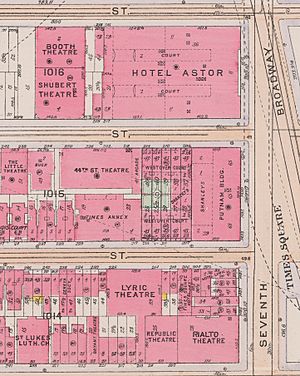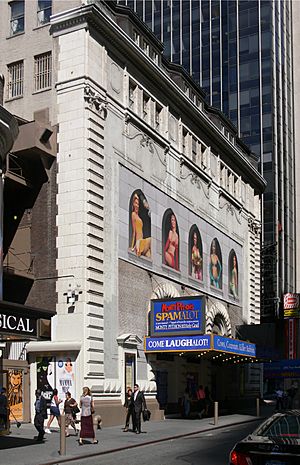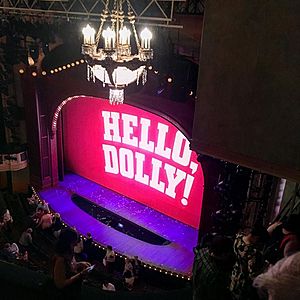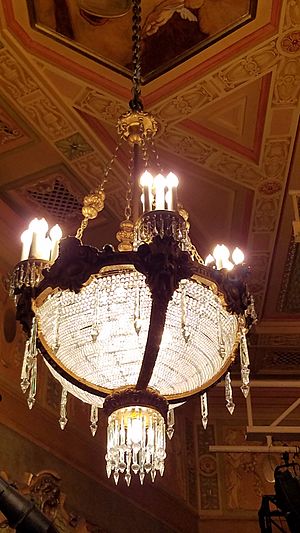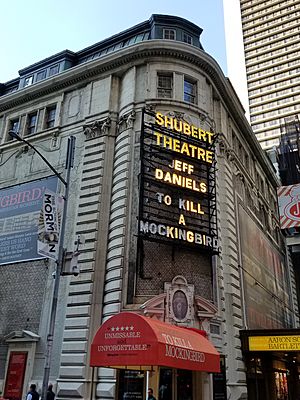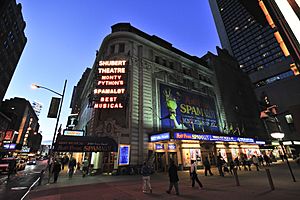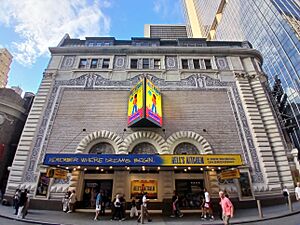Shubert Theatre (Broadway) facts for kids
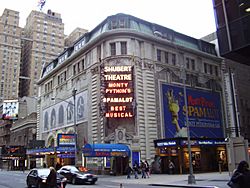 |
|
| Address | 225 West 44th Street Manhattan, New York United States |
|---|---|
| Coordinates | 40°45′29″N 73°59′14″W / 40.75806°N 73.98722°W |
| Public transit | Subway: Times Square–42nd Street/Port Authority Bus Terminal |
| Owner | Shubert and Booth Theatre, LLC |
| Operator | The Shubert Organization |
| Type | Broadway |
| Capacity | 1,502 |
| Production | Hell's Kitchen |
| Construction | |
| Opened | October 2, 1913 |
| Architect | Henry Beaumont Herts |
| Designated | December 15, 1987 |
| Reference no. | 1378 |
| Designated entity | Facade |
| Designated | December 15, 1987 |
| Reference no. | 1379 |
| Designated entity | Lobby and auditorium interior |
The Shubert Theatre is a famous Broadway theater located at 225 West 44th Street in New York City. It opened in 1913 and was designed by architect Henry Beaumont Herts in an Italian Renaissance style. The theater was built for the Shubert brothers, Lee and J.J. Shubert. They named it in memory of their brother, Sam S. Shubert, who had died in an accident years earlier.
The Shubert Theatre can seat 1,502 people across three levels. It is operated by The Shubert Organization, a major theater company. Both the outside of the building, called the facade, and the inside are protected as New York City landmarks.
The building's exterior is made of brick and terracotta, with special carved decorations called sgraffito. The theater has a curved corner that faces Broadway. Inside, the auditorium has an orchestra level and two balconies. The walls and ceiling are covered with beautiful murals of mythological figures. Next to the stage, there are special seating areas called boxes. The theater also shares its stage house with the Booth Theatre next door.
The Shubert has been home to many famous and long-running shows. Some of its biggest hits include A Chorus Line, Chicago, Spamalot, and Matilda the Musical.
Contents
Location and Design
The Shubert Theatre is in the heart of Midtown Manhattan's Theater District, near Times Square. It sits on a block with six other theaters, making it one of the busiest areas for Broadway shows. The theater is next to the Booth Theatre, and together they share a famous walkway called Shubert Alley.
This alley was originally created as a fire escape path. It also allowed the Shubert and Booth theaters to be designed with corner entrances, making them more visible from Broadway. The Shubert brothers bought the land for these theaters from the wealthy Astor family in 1948.
The Building's Exterior
The Shubert and Booth theaters were designed to look like a pair. They both have a similar Italian Renaissance style, with curved corners facing Broadway. The Shubert's exterior is made of white brick and terracotta, a type of baked clay.
A special feature of the building is its use of sgraffito, a technique where layers of colored plaster are carved to create images. The sgraffito decorations on the Shubert are some of the few remaining examples in New York City. They show classical figures and patterns.
On 44th Street, the entrance has three large arches. Above them, a modern marquee displays the name of the current show. The walls are decorated with detailed carvings and panels. The building has a sloped mansard roof with windows.
Inside the Theater
The lobby is an elegant space with a marble mosaic-tile floor and a domed ceiling. From the lobby, guests enter the main auditorium.
The auditorium is designed to feel grand and impressive. It has an orchestra section, two balconies, and private boxes on the sides. The space is decorated with plaster reliefs and murals painted by J. Mortimer Lichtenauer. These paintings show mythological scenes and figures representing music and drama. The original colors were described as "old Venetian gold, absinthe green, and amethyst."
The stage is framed by a large, curved proscenium arch. The flat ceiling is shaped like a hexagon and is divided into sections with murals and decorative moldings. Six large chandeliers hang from the ceiling, lighting up the beautiful space.
History of the Theater
In the early 1900s, New York's theater district moved to the area now known as Times Square. The Shubert brothers, Lee and J.J., were powerful theater producers who wanted to build a special venue in memory of their brother, Sam. They hired architect Henry B. Herts to design two theaters side-by-side: the large Shubert Theatre and the smaller Booth Theatre.
Construction began in 1912. The project faced some delays, but the theater was finally ready to open in the fall of 1913.
Opening and Early Shows
The Shubert Theatre officially opened on October 2, 1913, with a revival of the play Hamlet. Lee Shubert said that by naming the theater after his brother, they were dedicating it in the most meaningful way they knew.
In its early years, the theater hosted many different types of shows. These included Shakespeare plays, musicals, and operettas (light operas). One of its first big hits was the operetta Alone at Last in 1915. Another successful show was the musical Maytime in 1917, which was so popular it had to be staged in a second theater at the same time.
Famous Productions Through the Decades
Through the 1920s and 1930s, the Shubert was home to popular revues like the Greenwich Village Follies. It also saw the debut of future star Bob Hope in the 1928 musical Ups-a-Daisy. In 1933, Fred Astaire made his last Broadway appearance in the musical Gay Divorce.
The theater also hosted serious plays. Idiot's Delight won the Pulitzer Prize for Drama in 1936. In 1939, Katharine Hepburn starred in The Philadelphia Story, a play that became a huge success.
During the 1940s and 1950s, the Shubert continued to host major hits. The musical Kiss Me, Kate moved to the theater in 1950. Bells Are Ringing starring Judy Holliday had a two-year run starting in 1956.
A Home for Long-Running Hits
The 1960s brought more famous shows, including Stop the World – I Want to Get Off and Promises, Promises. The theater also began hosting the annual Tony Awards, which celebrate the best of Broadway.
In 1975, a groundbreaking musical called A Chorus Line moved to the Shubert. The show was a massive success and ran for nearly 15 years, with over 6,000 performances. It became the longest-running show in Broadway history at the time and won a Pulitzer Prize.
After A Chorus Line closed in 1990, the theater welcomed other hits. The musical Crazy for You ran for over 1,600 performances in the 1990s. A revival of Chicago played at the Shubert from 1997 to 2003.
The 21st Century
The new century brought more blockbusters to the Shubert. The musical comedy Spamalot, based on the movie Monty Python and the Holy Grail, opened in 2005 and ran for almost four years. It was followed by the hit musical Memphis in 2009.
In 2013, the theater celebrated its 100th anniversary. That same year, Matilda the Musical opened and ran for nearly 1,600 performances. A revival of Hello, Dolly! starring Bette Midler broke box office records in 2017.
More recently, the theater hosted the acclaimed play To Kill a Mockingbird. After a temporary closure due to the COVID-19 pandemic, the theater reopened in 2021. As of 2025, the Shubert continues to be one of Broadway's most important and beloved theaters.
Notable Productions
The Shubert has hosted hundreds of shows. Here are some of the most famous ones, listed by the year they opened.
| Opening year | Name | Refs. |
|---|---|---|
| 1913 | Hamlet | |
| 1917 | Maytime | |
| 1926 | Countess Maritza | |
| 1933 | Gay Divorce | |
| 1936 | Idiot's Delight | |
| 1937 | Babes in Arms | |
| 1939 | The Philadelphia Story | |
| 1943 | Othello | |
| 1944 | Bloomer Girl | |
| 1947 | High Button Shoes | |
| 1948 | Anne of the Thousand Days | |
| 1950 | Kiss Me, Kate | |
| 1951 | Paint Your Wagon | |
| 1953 | Can-Can | |
| 1956 | Bells Are Ringing | |
| 1959 | Take Me Along | |
| 1962 | Stop the World – I Want to Get Off | |
| 1968 | Promises, Promises | |
| 1973 | A Little Night Music | |
| 1975 | A Chorus Line | |
| 1992 | Crazy for You | |
| 1996 | Chicago | |
| 2003 | Gypsy | |
| 2005 | Spamalot | |
| 2009 | Memphis | |
| 2013 | Matilda the Musical | |
| 2017 | Hello, Dolly! | |
| 2018 | To Kill a Mockingbird | |
| 2022 | Some Like It Hot | |
| 2024 | Hell's Kitchen |
Images for kids
See also
 In Spanish: Teatro Shubert para niños
In Spanish: Teatro Shubert para niños
- List of Broadway theaters
- List of New York City Designated Landmarks in Manhattan from 14th to 59th Streets


